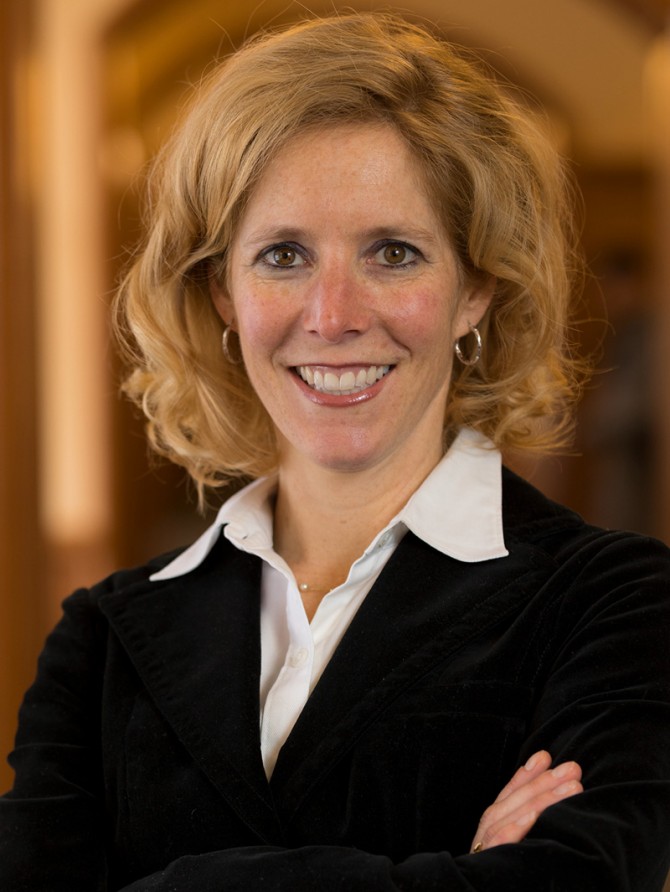
News directly from Cornell's colleges and centers
BTPI will research relationship between Bitcoin and financial freedom
By Giles Morris
The Brooks School Tech Policy Institute (BTPI) has announced a $1M project to study financial freedom in countries with authoritarian governments. Led by BTPI Director Sarah Kreps, John L. Wetherill Professor in the Department of Government in the College of Arts & Sciences and the Cornell Jeb E. Brooks School of Public Policy, the research will employ quantitative and qualitative approaches to understanding the use of Bitcoin and stablecoins by individuals around the world.
“If you live in a place where the government silences its critics by threatening their assets or where you cannot trust the local banking system, you understand the importance of financial freedom to democracy,” said Kreps. “We want to study how people in these countries are using Bitcoin and stablecoins in the pursuit of their financial security.”
The innovative approach to purpose-driven research is designed to build a framework for the creation of a Bitcoin and stablecoins adoption index that would map and analyze uptake globally. Supported by funding from Human Rights Foundation– a nonpartisan, nonprofit organization that promotes and protects human rights globally, with a focus on closed societies– and the Reynolds Foundation– a family foundation dedicated to supporting medical and spinal cord research and treatment, education, and democracy and freedom– the project is scheduled to kick off in July 2024 and conclude in 2026.
Reynolds Foundation president and CEO Dr. Álvaro Salas Castro MPA '14 explained the multimodal and collaborative nature of the inquiry would lead to wider access to knowledge at a critical moment in global policy.
"The Tech Policy Institute at Cornell University's Brooks School of Public Policy stands as a crucial center for investigating the intricate relationship between emerging technology and global politics. Through a dedicated focus on critical issues such as artificial intelligence, cybersecurity, and digital privacy regulations, the Institute's interdisciplinary research aims to shed light on the complexities of our rapidly evolving technological landscape," said Dr. Salas Castro. "As Bitcoin adoption continues to exert influence over the global economic system, the Institute's steadfast commitment to fostering collaboration among scholars, policymakers, and industry leaders aligns seamlessly with the Reynolds Foundation's vision to support a network of knowledge-sharing that harnesses this technology for societal benefit."
According to Professor Kreps, the project will focus on about 12 countries, including India, Nigeria, El Salvador, Indonesia, and Turkey, and investigate Bitcoin and stablecoin uptake. Kreps and her research team will partner with a major global research firm to develop and deliver surveys to 1,000 participants in each country that query not just adoption behaviors on the basis of demographic within each country but also perceptions and attitudes toward these digital currencies. A research team that includes undergraduate students will then conduct interviews to dig deeper into the basis for use.
According to HRF chief strategy officer Alex Gladstein, the combination of survey data and qualitative research in countries where relatively little is known about the use of Bitcoin and stablecoins represents a new approach to creating a baseline of understanding about their potential to enhance financial freedom around the world.
"Bitcoin continues to grow into a bigger part of the global economic system. Today we have nation-state adoption, widespread mining operations on all continents, spot Exchange Traded Funds (ETFs) trading in the United States, and recent all-time-highs in price. The Human Rights Foundation has also observed that human rights groups and nonprofits are adopting Bitcoin in order to challenge financial repression from authoritarian regimes," said Gladstein. "This research under Professor Kreps will illuminate exactly who out there in the world is using Bitcoin and dollar-substitute stable coins, and why."
The goals of the financial freedom research project include:
- Increasing shared understanding of the factors driving cryptocurrency adoption, usage patterns, and the broader implications for financial inclusion and technological innovation.
- Assessing the ability of policymakers, industry stakeholders, and community organizations to make informed decisions regarding regulatory frameworks, product development, and educational initiatives related to cryptocurrencies.
- Expanding access to financial services and economic opportunities for individuals who are underserved or excluded by traditional banking systems.
- Raising public awareness and understanding of cryptocurrency technology, its potential benefits, risks, and implications for individuals and society.
“Researchers have posited a number of different reasons why citizens in these countries might use crypto and our research will probe these mechanisms of uptake to understand motivations and goals and whether these vary depending on region or type of government,” said Kreps.
Giles Morris is assistant dean for communications in the Cornell Jeb E. Brooks School of Public Policy.
Media Contact
Get Cornell news delivered right to your inbox.
Subscribe



